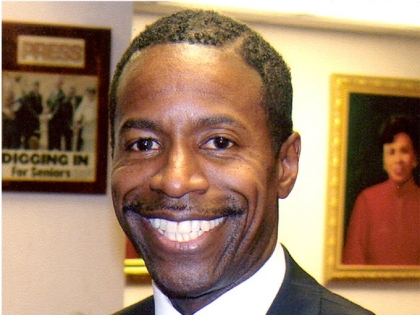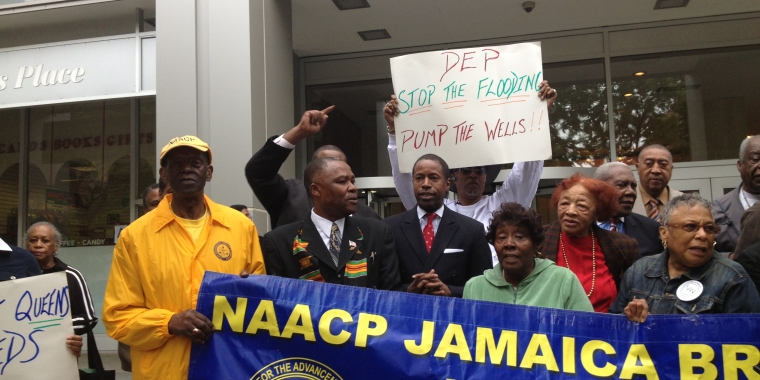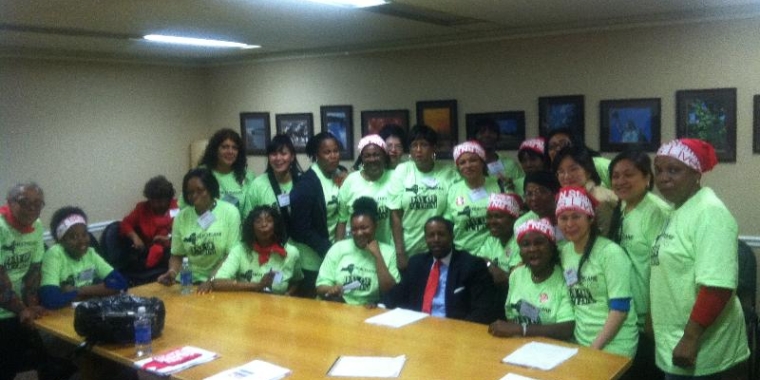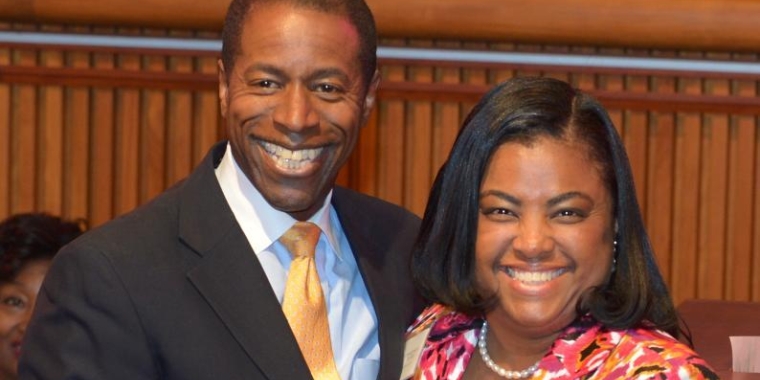
Senator Smith Applauds Governor Cuomo's Leadership on High-Speed Rail Funding
Malcolm A. Smith
April 4, 2011
Senator Malcolm A. Smith (13th Senate District, St. Albans) applauded Governor Andrew Cuomo's advocacy for nearly half a billion in available federal funding for high-speed rail projects in New York. Governor Cuomo announced today that he is seeking approximately $517 million in federal funding for eight projects along New York's Empire and Northeast Corridors, all of which are vital to improving the State's most traveled rail lines.
"These projects are vital to reducing congestion and improving reliability on two of the country's most heavily used passenger rail lines," Senator Smith said. "These projects are a crucial investment in bringing high-speed rail to New York, and also demonstrate our commitment to bringing quality jobs back to New York."
This is the second time that Governor Cuomo has publicly advocated to the federal government on the State's behalf. "Days after my election as Governor, I began pushing for more federal money for high-speed rail because New York has projects across the state that are ready to go," Governor Cuomo said. "New York is embracing high-speed rail as a faster way to move people and products and drive our economy in the 21st century, and these federal resources would help us achieve these goals."
Supportive of the Governor's efforts, Senator Smith said, "I commend the Governor's leadership on this advocacy, and promise to continue working with him in every capacity where I can be helpful. Whether it's reaching out to congressional leadership, assisting with implementation of our High-Speed Rail Planning Board, or working with my colleagues in Albany, I promise to continue my work on this once-in-a-generation challenge."
These projects cover an array of badly needed signaling improvements, congestion relief, and station and track construction - continuing the State's progress in implementing high-speed service in New York. This money has become available after federal government has made $2.4 billion in high-speed rail funding available after it was returned by the State of Florida.
A description of the projects, provided by the New York State Department of Transportation, includes:
Northeast Corridor Congestion Relief: Harold Interlocking: The largest application is for $294.7 million for the Metropolitan Transportation Authority's (MTA) Harold Interlocking plan. This project calls for the construction of a new conflict-free route for Amtrak along two miles of the Northeast Corridor where Amtrak service must cross over a flow of MTA Long Island Rail Road (LIRR) trains, resulting in significant and routine delays for Northeast Corridor service, particularly during peak periods.
The Amtrak bypass routes that will be constructed as part of this project will greatly improve reliability, on-time performance, and travel time for existing Amtrak service between New York and Boston and will provide the direct path through Harold Interlocking that is needed to make high-speed rail possible on the Northeast Corridor in the future.
Moynihan Station Phase 2 Final Design Project: The Governor is seeking $49.8 million to fund the final design of Phase 2 of the Moynihan Station Project, providing new passenger and back-of-house facilities for Amtrak. The Project will improve operational reliability and on-time performance at the station by allowing trains and people to move more efficiently through the Penn Station complex.
Northeast Corridor Congestion Relief: New Upper Hudson Line High-Capacity Signal System - Croton to Poughkeepsie: The $112 million project will construct a new high-capacity signal system to replace the present outdated signal system between Croton-Harmon and Poughkeepsie. The project will provide for higher capacity and reliability to all users and will result in improved on-time-performance and increased capacity.
Empire Corridor Capacity Improvements: Final Phase Signal Improvements Hudson Line:
At a cost of $18.6 million this project will replace the final 48 miles of the Hudson Line signal system between Poughkeepsie and Albany and bury the signal cable. The current system is 30 years old and outages in inclement weather account for most of the delay affecting all trains between Albany and New York City.
Empire Corridor Capacity Improvements: Final Phase 4th Track Construction at Rensselaer Station: This $35.4 million project will complete work at the new Rensselaer Station which was opened in 2002. The funding will be used to construct a new fourth track, extended platforms, realignment of existing tracks and new signal system.
Empire Corridor Capacity Improvements: Final Phase Track Construction at Schenectady Station: The Governor would use $4.1 million to make major upgrades to the Schenectady Station. Built in 1970, the station is in poor condition with inadequate track and platforms. CDTA has designed a new station and tracks and has State and local funding in place for constructing the station. This project will provide for construction of the track and platforms and complete the funding package necessary for the Schenectady Station replacement.
Empire Corridor West: Rochester Intermodal Station: The City of Rochester plans to replace the inadequate, 37 year old temporary Rochester Station with a new Rochester Intermodal Station. This $1.4 million project would complete the preliminary engineering and environmental work.
Empire Corridor West: Niagara Falls High-speed Rail Inspection and Maintenance Facility: This project will use $1.75 million to conduct the preliminary engineering and environmental analysis necessary to construct the first heated, in-door maintenance facility west of Schenectady on the Empire Corridor West. Employees at the present facility built in 1978 service 728 locomotives, 2,912 coaches and 728 food service cars annually. The facility has no enclosed heated building to thaw out frozen equipment and Amtrak mechanics must use torpedo heaters and hand held torches to get equipment operating. This project will prepare the construction of an enclosed heated building, inspection pit, compressed plant air, and a track catch basin in which to capture water and oils.
Northeast Corridor Congestion Relief: Harold Interlocking: The largest application is for $294.7 million for the Metropolitan Transportation Authority's (MTA) Harold Interlocking plan. This project calls for the construction of a new conflict-free route for Amtrak along two miles of the Northeast Corridor where Amtrak service must cross over a flow of MTA Long Island Rail Road (LIRR) trains, resulting in significant and routine delays for Northeast Corridor service, particularly during peak periods.
The Amtrak bypass routes that will be constructed as part of this project will greatly improve reliability, on-time performance, and travel time for existing Amtrak service between New York and Boston and will provide the direct path through Harold Interlocking that is needed to make high-speed rail possible on the Northeast Corridor in the future.
Moynihan Station Phase 2 Final Design Project: The Governor is seeking $49.8 million to fund the final design of Phase 2 of the Moynihan Station Project, providing new passenger and back-of-house facilities for Amtrak. The Project will improve operational reliability and on-time performance at the station by allowing trains and people to move more efficiently through the Penn Station complex.
Northeast Corridor Congestion Relief: New Upper Hudson Line High-Capacity Signal System - Croton to Poughkeepsie: The $112 million project will construct a new high-capacity signal system to replace the present outdated signal system between Croton-Harmon and Poughkeepsie. The project will provide for higher capacity and reliability to all users and will result in improved on-time-performance and increased capacity.
Empire Corridor Capacity Improvements: Final Phase Signal Improvements Hudson Line:
At a cost of $18.6 million this project will replace the final 48 miles of the Hudson Line signal system between Poughkeepsie and Albany and bury the signal cable. The current system is 30 years old and outages in inclement weather account for most of the delay affecting all trains between Albany and New York City.
Empire Corridor Capacity Improvements: Final Phase 4th Track Construction at Rensselaer Station: This $35.4 million project will complete work at the new Rensselaer Station which was opened in 2002. The funding will be used to construct a new fourth track, extended platforms, realignment of existing tracks and new signal system.
Empire Corridor Capacity Improvements: Final Phase Track Construction at Schenectady Station: The Governor would use $4.1 million to make major upgrades to the Schenectady Station. Built in 1970, the station is in poor condition with inadequate track and platforms. CDTA has designed a new station and tracks and has State and local funding in place for constructing the station. This project will provide for construction of the track and platforms and complete the funding package necessary for the Schenectady Station replacement.
Empire Corridor West: Rochester Intermodal Station: The City of Rochester plans to replace the inadequate, 37 year old temporary Rochester Station with a new Rochester Intermodal Station. This $1.4 million project would complete the preliminary engineering and environmental work.
Empire Corridor West: Niagara Falls High-speed Rail Inspection and Maintenance Facility: This project will use $1.75 million to conduct the preliminary engineering and environmental analysis necessary to construct the first heated, in-door maintenance facility west of Schenectady on the Empire Corridor West. Employees at the present facility built in 1978 service 728 locomotives, 2,912 coaches and 728 food service cars annually. The facility has no enclosed heated building to thaw out frozen equipment and Amtrak mechanics must use torpedo heaters and hand held torches to get equipment operating. This project will prepare the construction of an enclosed heated building, inspection pit, compressed plant air, and a track catch basin in which to capture water and oils.
Share this Article or Press Release
Newsroom
Go to NewsroomEmmlynn L. Taylor
May 13, 2013



